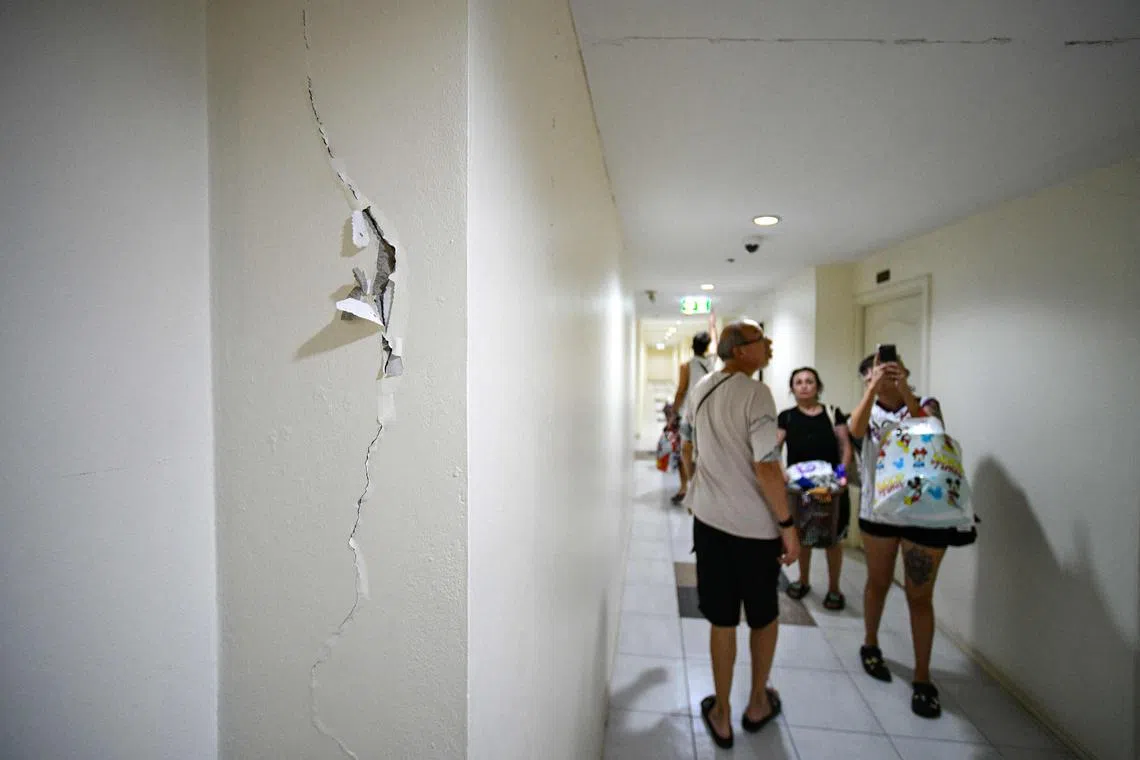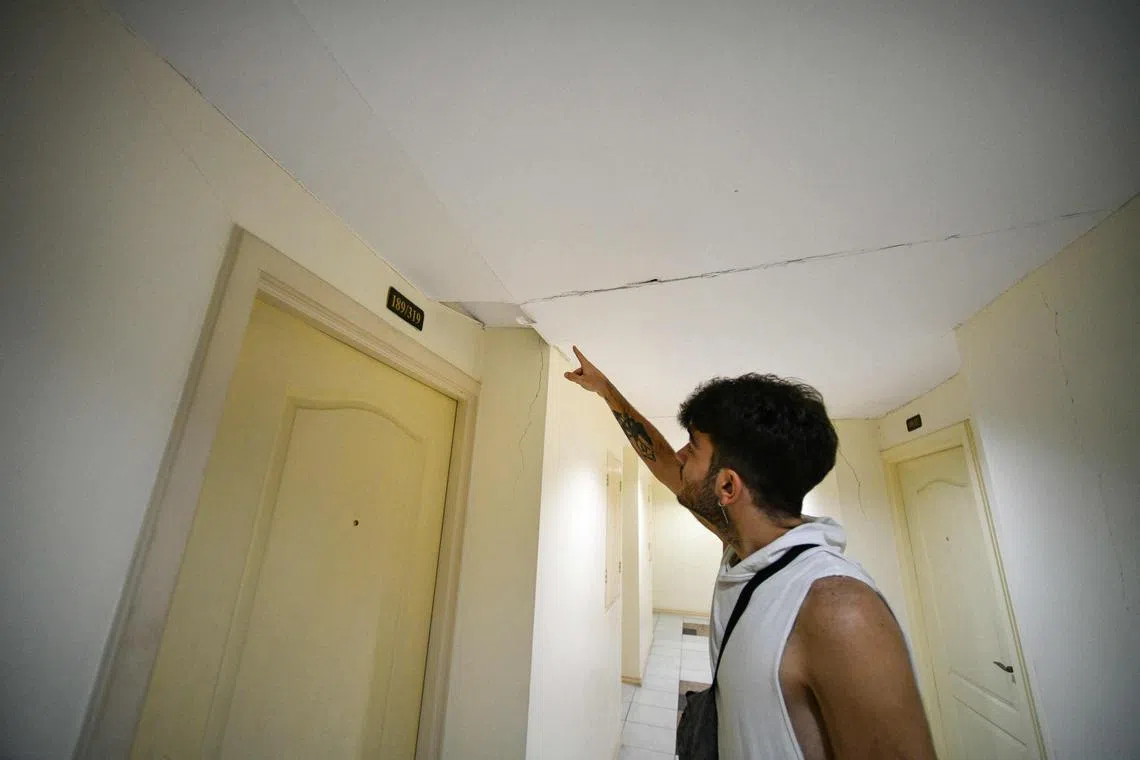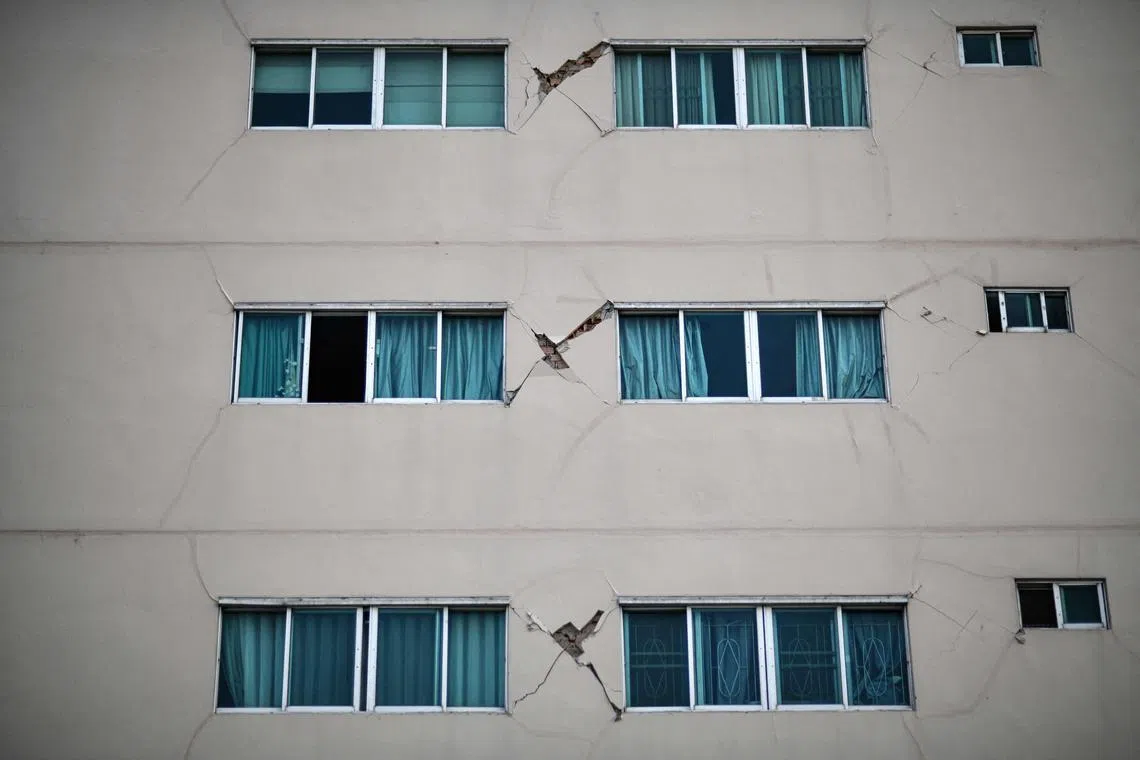‘Fear and anxiety’: Bangkok residents seek quake-proof homes
Sign up now: Get insights on Asia's fast-moving developments

The March 28 quake has prompted a flurry of inquiries from high-rise residents in Bangkok looking to relocate.
PHOTO: AFP
BANGKOK – Shaken hours earlier by a massive earthquake
Feeling unsafe in the building damaged by the biggest tremors to hit the capital in generations, the 23-year-old decided to stay away for two days until experts gave the high-rise the all-clear.
The sales coordinator is now one of many Bangkok residents wondering if they should seek safer housing in a city where hundreds of residential buildings were damaged by the 7.7-magnitude quake that struck neighbouring Myanmar on March 28.
The owners of Mr Phatsakon’s condominium assured him that engineers had checked every part of the building and concluded it was habitable.
But he is still spooked about the cracks.
“I feel a little bit scared. And also my mum told me to move out from here,” he said.
More than 1,000km away from the quake’s epicentre, the Thai capital – its skyline dotted with hundreds of towers and glinting high-rises – virtually never experiences such tremors.
Bangkok-based real estate consultant Owen Zhu, 40, said the impact on his sector
“People seem to have realised that living in high-rise buildings might carry greater risks when it comes to earthquake resistance compared with two-storey or low-rise structures,” the Chinese property expert said.
The earthquake has prompted a flurry of inquiries from residents looking to relocate in the past week, he says, due to widespread “fear and anxiety” of living far above ground.
‘Gap in perception’
Mr Yigit Buyukergun from Turkey was at home in Bangkok with his wife when the quake struck. After it subsided, they emerged from under a table to inspect the damage on their 22nd-floor flat.
“Everywhere is cracked, especially in the corridor. You can see all the roof is (in) really bad condition,” the 25-year-old said.
Despite Mr Buyukergun’s safety concerns, the owners of the block seemed unfazed.
They say it is “100 per cent safe, but I don’t believe it”, he said.

Turkish national Yigit Buyukergun pointing at a crack in the ceiling of his 22nd-floor flat in Bangkok after the March 28 quake.
PHOTO: AFP
A large number of studio apartments in Bangkok’s sprawling residential projects are rented out on annual leases requiring a two-month deposit.
Most condos do not permit short-term rentals for security reasons, and only hotels may lease for under 30 days.
Mr Zhu says tenants and property owners often disagree over the habitability of quake-damaged apartments, with disputes becoming more common.
There is “a gap in perception and judgment between the two parties”, he said.
“The landlord sees the unit as safe, while the tenant feels it’s unsafe and insists on moving out and getting their deposit back”.
Raising the bar
Earthquake safety standards for buildings in Thailand were “not particularly strict” before the disaster and not something property-seeking clients specifically asked about, Mr Zhu said.
Heightening anxiety since the quake was the shocking total collapse of a 30-storey under-construction tower
The city authorities are now investigating whether substandard building materials were used in its construction.
Mr Zhu says more of his clients are now opting for low-rises.

Cracks on the exterior of a residential condominium building in Bangkok after the 7.7-magnitude quake that struck neighbouring Myanmar on March 28.
PHOTO: AFP
For house hunters still considering high-rises, they often require that the property sustained “minimal or no damage during the recent earthquake, or at least was not severely affected”.
He believes property prices will grow in the long term as demand for safer buildings drives the adoption of costly seismic resistance measures, adding that “the bar for Thailand’s real estate sector has been raised”.
But for Mr Buyukergun, talk of improving building regulations is not enough to calm his fears about the uncontrollable factors of geology.
While the prevalence of earthquakes in his home country of Turkey makes him feel uneasy, he does not expect to feel the same way about Thailand.
“Thailand is safe,” he recalled thinking before.
“That’s why I couldn’t believe (the) earthquake (happened).” AFP


